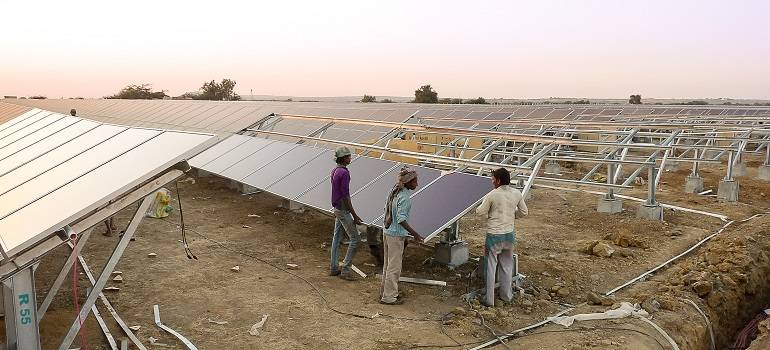
Amid uncertainty over the return of migrant labourers who left for their villages due to the COVID-19 fears, Sterling and Wilson Solar is planning to train the locals to compensate for the shortage, a top company official said.
Lakhs of migrant labourers fled to their villages especially in Uttar Pradesh, Bihar and Orissa, as economic activities had come to a standstill due to the lockdown and COVID-19 cases were rising.
“The prolonged lockdown that brought all economic activities to a grinding halt and the subsequent migration of labourers have significantly impacted the execution of projects. Now that restrictions are getting over slowly, we have started to pick up pace, but the shortage of labourers is still a challenge,” its Global CEO and Director Bikesh Ogra told over phone.
He noted that mobilising the workers, who have gone to their villages, back to the construction sites is a time-consuming effort.
“What we are doing instead is training the locals. In the past wherever we have done our projects, we have created local communities and imparted training to them. So, historically, they have acquired the skills. Therefore, by training the locals, the deficiency (of labourers) that we feel for the next 2-3 month would be compensated,” he added.
Sterling and Wilson Solar, part of the Shapoorji Pallonji Group, which has a presence not just in the domestic market but also in the US, Australia, Latin America, Africa and the Middle East, among others, had faced execution challenges globally as well.
“While the execution of projects was at a much slower pace in Australia, construction activities in other markets came to a grinding halt in the past few months. We feel that by the end of the second quarter of this year, there will be a buzz around the solar projects assuming that there is no further re-emergence of the coronavirus in those countries. However, we will see a muted first quarter due to these execution hurdles,” Ogra added.
However, he did not elaborate on the extent of the impact on the topline (revenue) and bottomline (profit) for the April-June quarter.
Even as the execution has been a challenge, the company has been able to bag large orders during the current quarter, he said.
“We will be bidding for nearly 22 GW (gigawatts) of projects this fiscal across the markets where we are present. Of this, almost 4 GW of orders have been tendered and we have bagged over 1 GW of projects. We are hopeful of bagging a significant number of orders during the year,” Ogra added.
With the latest 194-megawatt (MW) solar contract worth Rs 747 crore bagged in the US, the company’s total portfolio stands at 10.6 GW, including completed and under-construction projects and operation and maintenance portfolio of 7.5 GW.
When asked about the revenue guidance for the current financial year, he said, “We are still evaluating the situation and, therefore, would not be able to give any forecast right now. But, considering our existing order book pipeline along with the foreseeable future business, we expect that the turnover and profitability in the current year will be better than last fiscal. This is provided that the COVID-19 situation does not escalate in our target markets.”
The company’s net profit for 2019-20 declined 51.48 per cent to Rs 310.06 crore as against Rs 638.99 crore during the previous year, while the revenues declined 32.34 per cent to Rs 5,575.29 crore from Rs 8,240.41 crore in 2018-19.
Source: PTI

